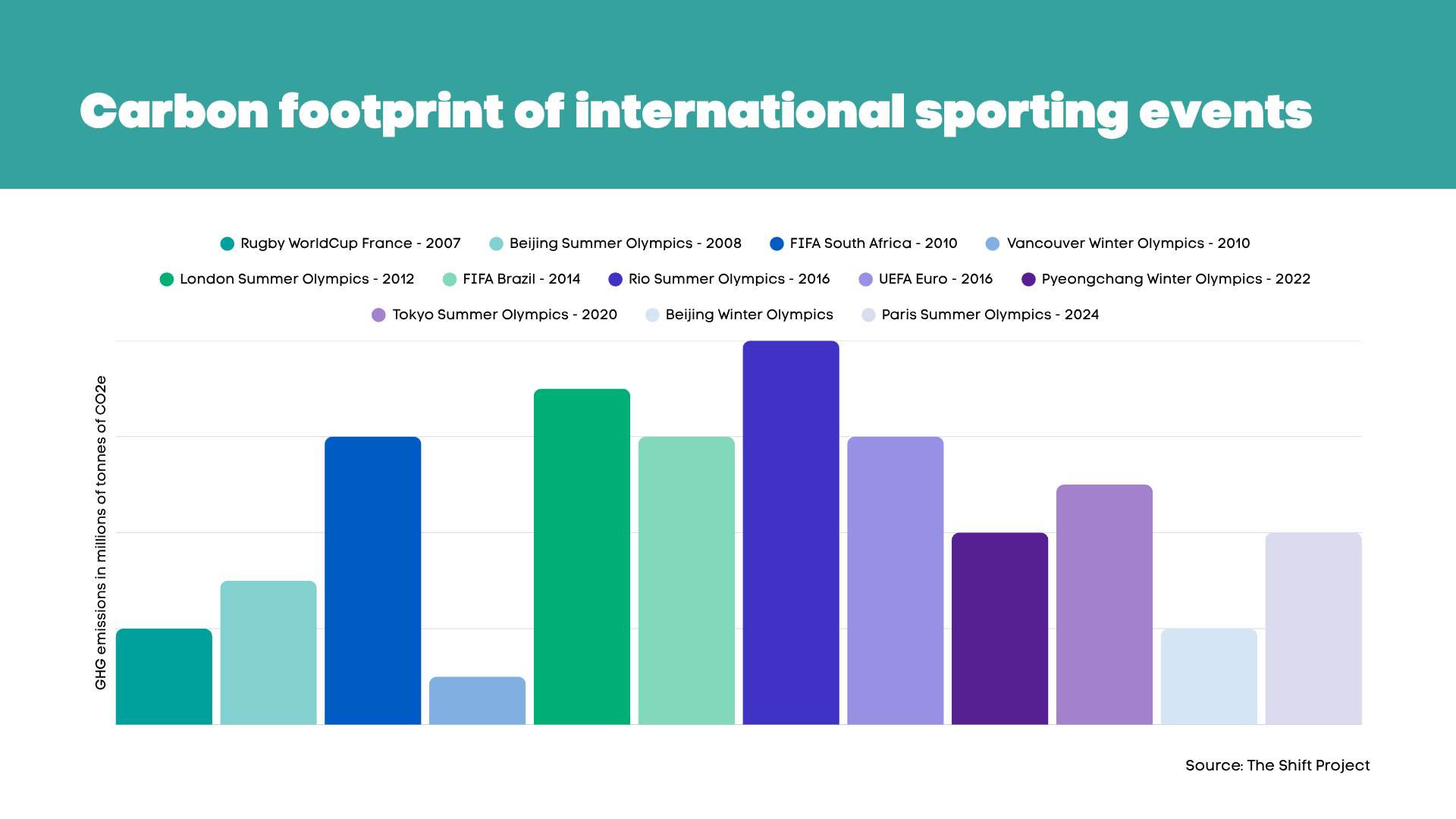Sustainability in Sports: Turning Environmental Challenges into Strategic Opportunities
Discover how the sports industry can turn environmental challenges into strategic opportunities through innovation, regulation, and sustainable leadership.
Summary
The environmental impact of the sports industry
Regulations reshaping the american sports landscape
Sustainability as a performance driver
The fundamentals of an effective sustainability strategy
Technology powering ecological transition
Our vision
Facing the climate emergency, the sports world stands at a critical crossroads. With its enormous influence on public opinion and role as a carrier of societal values, the sports sector has powerful leverage to drive ecological transition forward. Our experience shows that sustainability is no longer just an option—it's a strategic necessity.
We firmly believe sports organizations that hesitate to embrace this transformation risk falling behind, both compared to competitors and in meeting the growing expectations of their communities. On the flip side, those who fully commit to sustainability turn this challenge into a genuine catalyst for innovation and increased influence.
The environmental impact of the sports industry
Sports have a much bigger environmental footprint than we often realize. From energy-hungry venues and international travel to food, lodging, and waste generation, every layer of the ecosystem plays a role. And when it comes to major global events, the numbers are staggering: the carbon footprint of the Rio 2016 Olympic Games alone was estimated at 3.5 million tons of CO₂e.
That scale is driven by massive logistics — stadium construction, millions of spectators, international flights, accommodations, food services, and daily operations over several weeks. Whether it’s a local league or a global event, the message is clear: the sports world needs to rethink how it operates if it wants to reduce its impact and stay relevant.
Regulations reshaping the american sports landscape
Beyond ethics, the evolving American legal framework now demands faster adoption of sustainable practices. The Securities and Exchange Commission's (SEC) recent climate disclosure initiatives mark a critical shift for professional sports organizations.
Several regulations now impact sports entities across the United States:
SEC proposed rule on climate risk disclosure for public companies
State laws like the California Climate Corporate Accountability Act
Increasing sustainability requirements from major leagues (NFL, NBA, MLB, NHL)
Getting ahead of these changes offers a significant strategic edge. Organizations proactively developing sustainability strategies not only sidestep regulatory risks but also position themselves favorably with environmentally conscious fans and sponsors.
Sustainability as a performance driver
Recent studies show that environmental commitment delivers numerous concrete benefits, still often overlooked by leaders:
🚀 Strengthened economic performance
Optimizing energy and material resources significantly reduces operational costs. Implementing energy and waste management systems directly improves sports facility efficiency.
📢 Enhanced commercial appeal
As sponsors place increasing importance on ESG (Environmental, Social, Governance) criteria, a clear sustainability strategy becomes a competitive differentiator. Committed organizations more easily attract new partners and strengthen existing business relationships.
👥 Improved internal cohesion
Environmental initiatives create positive team dynamics by rallying employees around a common goal. This boosts engagement, improves workplace culture, and strengthens the sense of belonging to a meaningful project.
💪 Expanded community impact
Sustainable, locally-focused actions meet growing societal expectations and strengthen ties with local communities. They enhance the club or organization's image while making tangible contributions to community well-being.
The fundamentals of an effective sustainability strategy
Our support approach is built on four essential pillars:
1️⃣ In-depth, personalized assessment
Before taking action, a thorough inventory is essential. Our methodology combines analysis of material and energy flows, travel mapping, carbon footprint assessment, and identification of key expenditure areas.
2️⃣ Co-creation of strategic vision
Roadmap development systematically involves all stakeholders. This collaborative approach ensures collective buy-in and ownership of objectives—essential conditions for successful transformation.
3️⃣ Implementation and ongoing monitoring
Execution revolves around custom environmental performance indicators and a dynamic dashboard to effectively track progress.
4️⃣ Strategic promotion of achievements
Communicating results is integrated into a comprehensive promotion strategy. Our responsible communication expertise helps organizations avoid greenwashing pitfalls while maximizing the impact of their actions.
“It was such an honor to have Earth Angel on our team! They helped ensure that our events were sustainably produced along with setting standards and examples for the industry.”
— Dan Thorman (Co-Founder of Collidescope Foundation and LA Climate Week)
Technology powering ecological transition
To maximize sustainable strategy impact, we consistently recommend digital tools specifically designed for carbon footprint management.
The GreenPro solution, which we developed specifically for the cultural and creative sector, offers:
Automated carbon data centralization
Dynamic sustainability indicator tracking
Features tailored to cultural and creative industry needs
An intuitive interface accessible without advanced CSR expertise
Adopting these digital tools dramatically reduces administrative burden while significantly enhancing environmental management precision.
In practice, GreenPro cuts carbon data collection time by 75% — thanks to automated data flows, smart integrations, and real-time tracking. What previously took weeks can now be accomplished in just days!
Our vision
The future of sports is firmly tied to sustainability. Our conviction, shaped by years supporting various organizations, is that those who anticipate this transformation will become tomorrow's leaders.
This transition goes beyond mere regulatory compliance or token gestures. It demands a fundamental overhaul of governance, operations, and organizational culture.
Our ambition is to cultivate environmental expertise throughout the sports sector, enabling every organization, regardless of size, to transform ecological challenges into genuine strategic opportunities.
Ready to engage your sports organization in a structured, effective sustainability approach?
Contact our experts for a personalized assessment and discover how to transform environmental challenges into lasting competitive advantages.


